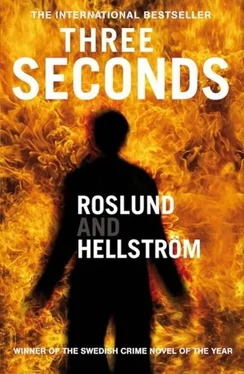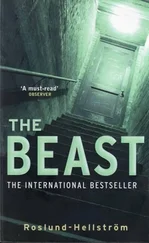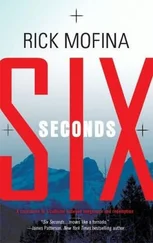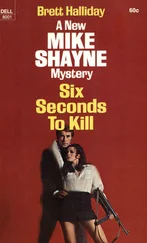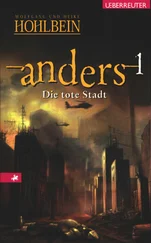The dread hounded him, translating into jerky movements and a nervous cough. Fredrik Göransson had been walking for ten minutes now in endless circles, between the window and the desk in one of the rooms of the Government Offices, and he hadn't gotten anywhere.
"We made sure that the prisoners got the information about a snitch." The crumpled map was in the wastepaper basket-he picked it up and unfolded it.
"We forced him to act."
"He had a job to do."
The national police commissioner had let the state secretary answer thus far. Now he looked at his colleague.
"That didn't involve threatening another person's life."
"We burned him."
"You've burned other informants before."
"I have always denied that we even work with infiltrators. I've stood by and watched without giving any protection when an organization has dealt with that person. But this… this isn't the same. This isn't burning him. This is murder."
"You still haven't understood. We are not the ones who will make the decision. We are only providing a solution for the police officer who will make that decision."
The agitated man with the jerky movements couldn't bear to stand still any longer, and with the dread chasing right behind him, he made a dash past the table to the closed door.
"I want no part in this."
He wasn't cold anymore. The floor that smelled of diesel was just as hard and just as cold, but he didn't feel the cold, nor the pain in his knees, he didn't even think about the fact that he was naked and bound, and would shortly get another kick in the side from someone who intermittently whispered that he was going to die. Martin Jacobson didn't have the strength to speak, to think-he lay down and didn't move. He wasn't even sure if he was seeing the things he saw now, if Hoffmann really did walk over to the largest workbench and pull a plastic pocket from the waist of his trouser that had some kind of fluid in it; if he then cut it into twenty-four equally sized pieces and with a roll of tape from the shelf, attach them to the nameless prisoner's head, arms, back, stomach, chest, thighs, lower legs and feet; and if he took from the same place something that looked like a thin piece of pentyl fuse that was several meters long and wrapped it around and around the prisoner's body. If that was the case, if what he saw was what was really happening, he couldn't face anymore. He turned his eyes slowly the other way so he didn't need to see-there was no room left for things he didn't understand.
One of the three chairs that had been pulled out from the conference table was empty, and the person whose office it was, a state secretary from the Ministry of Justice, ran her hand back and forth over a crumpled map as if subconsciously trying to smooth out the bumps that shouldn't be there.
"Can we do this?"
The man opposite her, a national police commissioner, heard her question but knew that it didn't mean just that she was asking if they were capable of something, no one would contend that, it wasn't Göransson alone who was going to solve this, the possibility didn't vanish along with him. What she was really asking was do we trust each other, or perhaps do we trust each other enough to first solve this and then to stick to what we've decided, especially the consequences?
He nodded.
"Yes, we can do this."
The state secretary had moved over to the bookshelf behind the desk and taken a pile of black spines from a file. She leafed through them and found the statute she was looking for: SFS 2002:375.
Then she turned on her computer and logged on, opened the complete version and printed out two copies.
"Here. Take one."
SFS 2002:375.
Ordinance on support for civil activities by the Swedish Armed Forces. She pointed at the seventh paragraph.
"This is what it's about. This is what we have to find our way around.
When support is given pursuant to this Ordinance, members of the
Armed Forces cannot be used in situations where there is a risk that
they may be required to use force or violence against a private individual.
They both knew exactly what that meant. It would not be possible to use the armed forces for police activities. For nearly eighty years, this country of theirs had sought not to resolve problems by allowing the military to shoot at civilians.
But that was precisely what they had to do.
Are you of the same opinion? Do you agree with the DS who is in situ? That the only way to resolve this, for a shot to be fired from here that will reach… here, to this building… is to use a military marksman?"
The state secretary had smoothed out the map enough for it to be possible to follow her finger.
"Yes. I'm of the same opinion. More powerful guns, heavier ammunition, better training. I've been asking for that for several years now."
She smiled wearily, got up and walked slowly round the room.
"So, the police are not allowed to use the snipers who are employed by the armed forces."
She stopped.
"The police can, however, use the marksmen who are employed by the police. Is that not the case?"
She looked at him and he gave a hesitant nod and threw his hands up in the air-she was aiming at something, but he had no idea what. She went over to the computer again, looked at the screen for a while, then printed out another document in duplicate.
"SFS 1999:740."
She waited until he had found the right page.
"Ordinance on police training. Paragraph nine."
"What about it?"
"We'll start there and work our way forward."
She read out loud:
The National Police Board can, under special circumstances, grant
exemptions from the training set out in this Ordinance .
The national police commissioner shrugged.
"I'm familiar with that paragraph. But I still don't understand what you're getting at."
"We'll employ a military marksman. For police service as a police sniper." "He would still be military staff and not have formal police training." The state secretary smiled again.
"You are, like me, a lawyer, is that not so?"
"Yes."
"You are the national police commissioner. You have police authority, don't you?"
"Yes."
"Despite the fact that you do not have formal police training?" "Yes."
"So let's use that as our starting point, and work toward a solution." He was none the wiser as to where she was heading.
"We'll find a trained, equipped military marksman. With the cooperation of his superiors, we'll discharge him from service in the armed forces and then make the newly discharged military marksman an offer of a… say… six-hour temporary contract with the police. As a superintendent or another rank. You choose what rank and title you want him to have."
He wasn't smiling, not yet.
"So, he will be employed by the police for exactly six hours. He will complete his contract. And he will then, six hours later, apply for the vacant position that the armed forces haven't yet had time to advertise, and be reinstated."
Now he was starting to understand what she was getting at.
"And what's more, the police never give out the names of their marksmen, during or after an operation."
Exactly what she was getting at.
"And so no one will know who fired the shot."

An empty, clean building.
A floor that no feet had stamped on, windows that no eyes had stared through.
There were no lights on in the building, no sound, even the unused door handles shone. Lennart Oscarsson had envisaged the inauguration of the newly built Block K, with even more cells, greater capacity, more prisoners, as a manifestation of a newly appointed chief warden's ambition and drive. That would never happen now. He walked down the empty corridor, past the wide-open cell doors. He was about to turn on the strong lights and activate the new alarm system and soon the smell of paint and newly upholstered pine furniture would blend more and more with fear and badly brushed teeth. The uninhabited cells would instead be inaugurated in a few minutes' time by hastily evacuated prisoners from Block B who were under serious threat with the national task force prepped at every door and window, guns at the ready, and a hostage situation on the second floor of the building that no one really knew anything about, why the man had done it, his aims and demands.
Читать дальше
